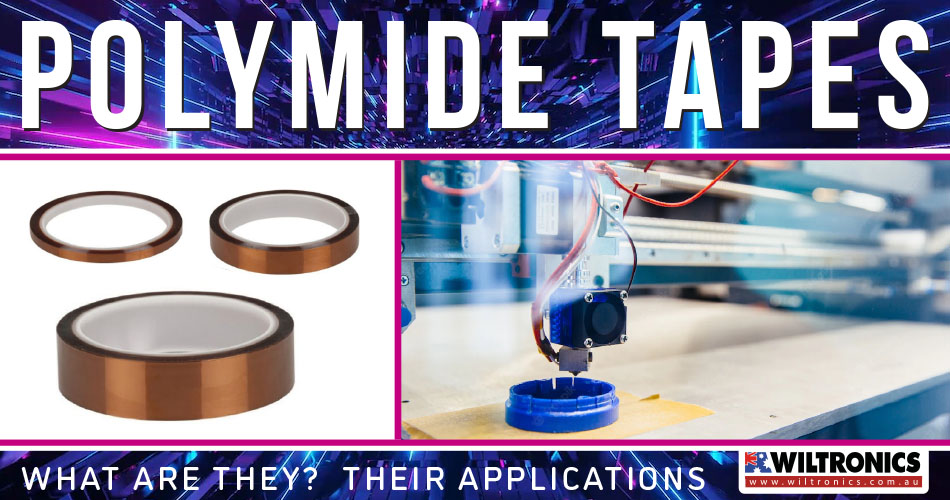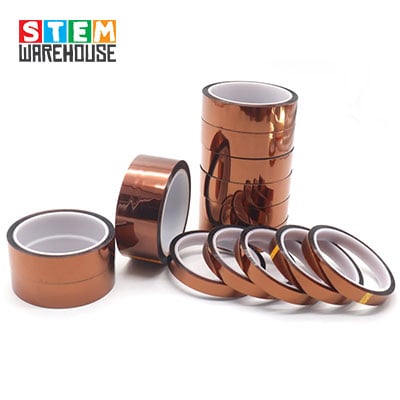What Are Polyimide Tapes and Their Applications
December 12, 2022

Polyimide tapes are not your ordinary adhesive tapes.
Working in the electrical trade involves insulating wires and cables. To protect, insulate, and shield these wiring systems, pressure-sensitive tools are a must. Enter insulating tapes.
Electrical tapes have widespread uses in domestic and professional environments. Also, they are available in different types for a wide range of applications.
One of the most commonly-utilised forms of electrical adhesives is polyimide tapes. Each of these tapes has its own specific use. This can mean that polyimide has distinct functions from standard ones.
Keep reading to learn more about what polyimide tapes are and their differences.
Polyimide Tapes
You may or may not have used polyimide tapes before. And if you have, you might know it under a different name, though: Kapton tapes. Check your toolbox and see if you own one. Known for its great adhesion and thermal resistance, it is a must for electricians and DIYers.
A polyimide tape consists of an amber-coloured film coated with silicone adhesive. The standard is acrylic based and can either be conductive or non-conductive.
Its pressure-sensitive qualities make it ideal for use as insulation. This includes applications that require good chemical or high-temperature resistance.
Polyimide
The key to polyimide’s strength lies in what it is made of — polyimide, a polymer made of imide monomers. An imide is a group of two acyls bound to nitrogen. A monomer is a molecule that bonds with other identical molecules to form a polymer. This process is referred to as polymerisation.
Polyimide comes in many forms; it can be metallised, laminated, and even punch-formed. Its ability to make into any desired shape gives it increased functionality.
Features and Qualities
A polyimide tape is a low-outgassing material with ideal high-temperature resistance, including:
- Excellent thermal conductivity
- Low-radiation interference
Unaffected by acids and oils, it keeps electrical components at a consistent temperature. Moreover, it has an indispensable trait in wave soldering and powder coating. This makes it fitting for electric insulation in X-ray devices and radioactive environments. Many industries, including space exploration and even electronics companies like Apple, rely upon this super tape.
Although polyimide is a great heat resistor, that does not mean it cannot burn. But the way it handles fire makes it more desirable. For one, it is self-extinguishing. If it catches fire, it extinguishes itself, leaving only the surface level of the tape charred.
As for the specs, the adhesive has a thickness of about 0.095mm without the liner and 0.1mm with it. The strength comes in about 200 kilopascals (kPa) and a dielectric strength of 6.5 kilovolts (kV).
Standard widths: 6mm, 9mm, 12mm, 18mm, 21mm, 24mm, 150mm, 200mm, 300mm.
As mentioned, it uses a silicone adhesive with a strength of around 6N. This ensures the strongest stick while being one of the thinnest insulators. When stored properly, shelflife lasts about 36 months after the date of manufacture.
Applications of Polyimide Tapes
Polyimide tapes are used for applications that require thermal or electrical insulation properties. This includes the following:
- Bed surface for 3D printing
- Fastening heating elements
- Insulating and fastening flexible PCBs
- Insulation of coils in electric motors
- Interlayer insulation in motors and transformers
- Magnet wire and cabling
- Masking for powder coating
- Slot liner insulation
Various professions also use polyimide tapes, such as:
- Aeroplane industry
- Automotive technicians
- Companies that use 3D printers
- Construction industry
- Electricians
- Manufacturing industries
- Spacecraft manufacturers
While some use them for insulation, others utilise them for their chemical resistance. Any profession that deals heavily with electronics will benefit from using them.
Kapton vs Polyimide Tapes
Just to be clear, Kapton is a brand-name version of polyimide tapes. Developed specifically by DuPont, for a tape to be called Kapton Tape, it must use DuPont™ Kapton®.
Kapton tapes are excellent high-temperature electrical insulation and masking tapes. They have strong hydrogen bonds made at temperatures as high as 300°C.
Like polyimide, they are used for insulation, heat control, and chemical resistance. Many Kapton tapes are on the market, all made (or utilise material made) by DuPont.
Get Your Polyimide Tapes Here!

High Temperature Polyimide Tape Precision Thermal Insulation
Embrace cutting-edge efficiency with our High Temperature Polyimide Tape Precision Thermal Insulation. Perfect for professionals in demanding industries, this tape provides unparalleled precision and durability under extreme conditions.
Widths Available: 3mm, 5mm, 10mm, 15mm, 25mm
3D Printer Polyimide Tape High Temp Thermal Insulation
Experience the ultimate solution in 3D printing with our 3D Printer Polyimide Tape High Temp Thermal Insulation. Specially designed to combat the challenges of high-temperature 3D printing, this tape is your key to flawless, warp-free prints.
Widths Available: 35mm, 50mm, 100mm
We also offer a wide range of adhesives and glues for your electrical projects. Make sure to check them out!
The Bottom Line
Polyimide tapes are one of the most heat-resistant adhesives available on the market. Their superior strength even made them suitable for satellites and spacecraft. An absolute essential, indeed, when working with electrical components.
© Electrotech Brands Pty Ltd 2022


Write a Comment
You must be logged in to post a comment.